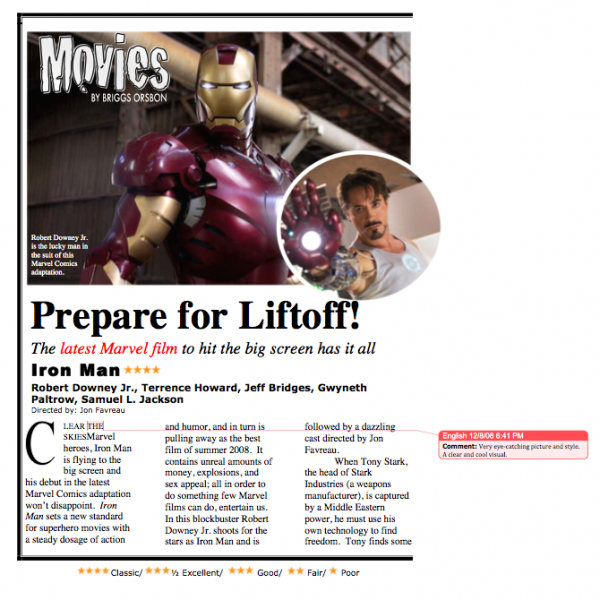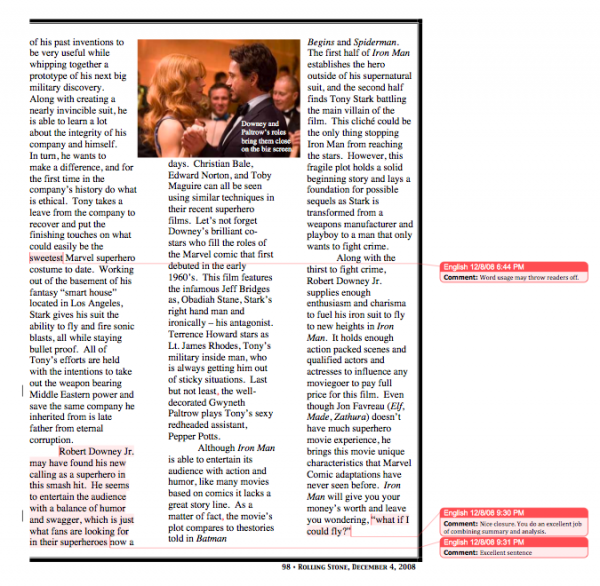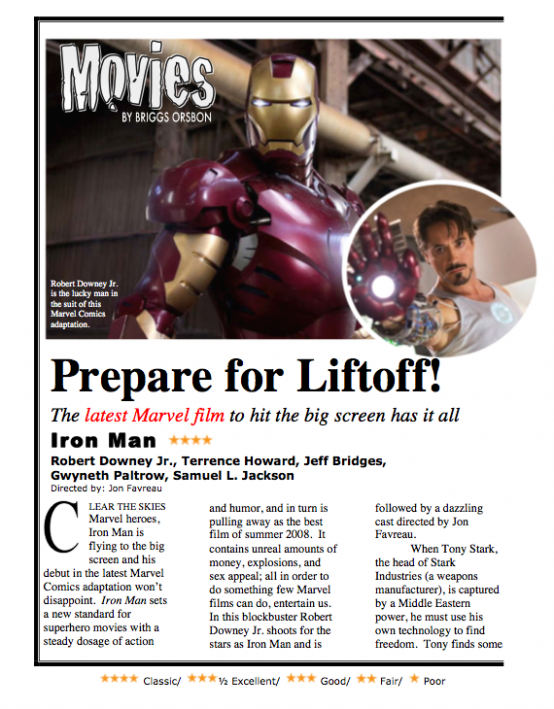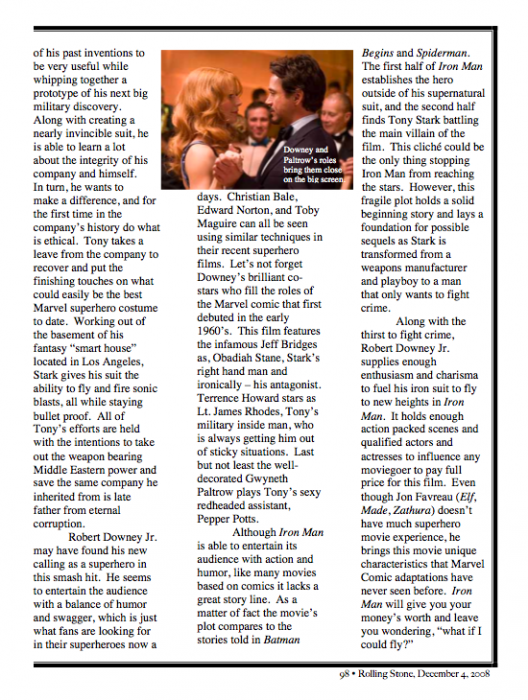Movie Review Project
Unique Reviews
Movie reviews come in all shapes and sizes, but they all have one common goal: to inform readers about a movie they are interested in.
Every movie review contains some type of summary of the film to inform the readers about the movie. Nevertheless, it is important that the writer doesn’t give away too much of the main story. This is the problem with the review written by Jim Emerson on Roger Ebert’s website. The review is fairly lengthy and this is due to the fact that he gives too much detail in his summary of the film
Writers always tend to have a specific focus from the movie that results as the main subject in their reviews. Whether the focus of the review is the actors, director, genre, or the main subject matter depends upon the movie and its writer. Roger Ebert’s Iron Man review focuses on the subject matter of the film. In view of the fact that this review focuses on the subject of the film it is easy to understand why it contains such a lengthy and detailed summary. The review from Rolling Stone takes a strong look at the actors and actresses in this movie and how they fill their roles. The writer is claiming the movie’s success is due to its stars when he proclaims, “Iron Man is a class act all the way. What kind of popcorn flick gets the great, dangerously charming Jeff Bridges to shave his head to play Obadiah Stane, the chief villain” (Travers)? The review done by Entertainment Weekly seems to focus more on the “comic-book film” genre that Iron Man falls into. The writer’s focus results in several allusions to Toby Maguire and Christian Bale, the Hollywood stars that play the roles of Spiderman and Batman in other recent “comic-book films.”
Although movie reviews tend to talk about the positives of a film, it is the writer’s job to also make an emphasis on a movie’s weaknesses. This can be referred to as the counterargument of the review and is more simply put, the opposite of the writer’s true opinion of the movie. Jim Emerson felt that this movie’s weakness was created by the way the director, actors, and actresses showed a lack of respect for the genre of the movie. This is understood in Emerson’s counterargument as he states, “The reason it’s (Iron Man) so nimble is that director Jon Favreau and his fleet crew of actors grasp the action-fantasy premise and treat it with the looseness and sharpness of improvisational comedy” (Emerson). Peter Travers’s counterargument states that the movie’s plot is what keeps Iron Man from being a five star movie. Although he briefly touches on this weakness, he lacks substance when it comes to providing support for this statement. Entertainment Weekly’s Owen Gleiberman makes a counterargument that like other “comic-book films”; Iron Man’s plot suffers from a split personality. Gleiberman is referring to the great special effects in the movie verses the dull story of the life of the regular-guy superhero.
Finally, in every movie review there is personal opinion of the film mixed in with all of the other elements of a review. The opinion of the writer is what decides the angle of the entire argument for the review. Although the review from Roger Ebert only gives this film three stars, the writer claims Iron Man is winning the attention of those who have never cared for “comic-book films” (Emerson). It’s these feelings from the writer that lead to this closing statement, “In so doing, he (Jeff Bridges) and his colleagues have made Iron Man more than just a generic comic book movie” (Emerson). Rolling Stone’s review gives this film three and a half stars, and takes a positive approach throughout the entire review. Travers uses adjectives like “spectacular” to describe the movie, but this comment says it all, “Iron Man is the shit because Favreau is too funky to settle for slick” (Travers). Entertainment Weekly also published a review that came from a positive angle. Although the opinion and final thoughts of the writer are harder to depict in this review, the “B+” rating states that this film is above average.
In these three reviews of Iron Man the writer informed the reader of several positives and a few negatives of the film. The writers were able to accomplish this by using a summary, a focus from the movie, a counterargument, and their own personal opinions of the film. Depending on the way the writer viewed the film determined the angle that they took on creating their review. This is why it is possible to have hundreds of reviews for a single movie, while they all still have unique characteristics to inform their readers.
[E1]Excellent sentence and point.
[E2]Can you give an example?
Unique Reviews
Movie reviews come in all shapes and sizes, but they all have one common goal: to inform readers about a movie they are interested in. These reviews can even be a form of advertisement for a certain movie. However, depending on the writer’s opinion, it could be a positive or a negative appraisal for the movie. The writer of the review can depict their feelings about the movie and inform the reader by using several elements to strengthen their argument. These three reviews over the movie Iron Man contain a detailed summary, a specific focus from the movie, a counterargument, and the writer’s thoughts about the movie in order to inform the readers on the film.
Every movie review contains some type of summary of the film to inform the readers about the movie. Nevertheless, it is important that the writer doesn’t give away too much of the main story. This is the problem with the review written by Jim Emerson on Roger Ebert’s website. The review is fairly lengthy and this is due to the fact that he gives too much detail in his summary of the film. Emerson gives so many details that he reveals Iron Man’s villain in the film, Obadiah Stane. Therefore, the readers feel there is no reason to go to the movie and waste six dollars, because they lived the entire movie in this review. On the other hand, Rolling Stone magazine’s review of Iron Man, written by Peter Travers, contains a very short summary of the movie. This review lacks detail and leaves the readers with questions about the movie’s plot and storyline. Owen Gleiberman’s review for Entertainment Weekly contains a detailed summary that is sufficient in length and content of this film. The summary in this review holds enough detail to inform the reader, but more importantly uses unique wording in order to entice the readers. An example of the wording used comes at the beginning of the review when Gleiberman states, “As Tony Stark, a high-living celebrity weapons magnate who is wounded on a trek through Afghanistan, only to transform himself into a hulking mechanical rocket man, Downey doesn't dial down his eager narcissistic wit” (Gleiberman).
Writers always tend to have a specific focus from the movie that results as the main subject in their reviews. Whether the focus of the review is the actors, director, genre, or the main subject matter depends upon the movie and its writer. Roger Ebert’s Iron Man review focuses on the subject matter of the film. In view of the fact that this review focuses on the subject of the film it is easy to understand why it contains such a lengthy and detailed summary. The review from Rolling Stone takes a strong look at the actors and actresses in this movie and how they fill their roles. The writer is claiming the movie’s success is due to its stars when he proclaims, “Iron Man is a class act all the way. What kind of popcorn flick gets the great, dangerously charming Jeff Bridges to shave his head to play Obadiah Stane, the chief villain” (Travers)? The review done by Entertainment Weekly seems to focus more on the “comic-book film” genre that Iron Man falls into. The writer’s focus results in several allusions to Toby Maguire and Christian Bale, the Hollywood stars that play the roles of Spiderman and Batman in other recent “comic-book films.”
Although movie reviews tend to talk about the positives of a film, it is the writer’s job to also make an emphasis on a movie’s weaknesses. This can be referred to as the counterargument of the review and is more simply put, the opposite of the writer’s true opinion of the movie. Jim Emerson felt that this movie’s weakness was created by the way the director, actors, and actresses showed a lack of respect for the genre of the movie. This is understood in Emerson’s counterargument as he states, “The reason it’s (Iron Man) so nimble is that director Jon Favreau and his fleet crew of actors grasp the action-fantasy premise and treat it with the looseness and sharpness of improvisational comedy” (Emerson). Peter Travers’s counterargument states that the movie’s plot is what keeps Iron Man from being a five star movie. Although he briefly touches on this weakness, he lacks substance when it comes to providing support for this statement. Entertainment Weekly’s Owen Gleiberman makes a counterargument that like other “comic-book films”; Iron Man’s plot suffers from a split personality. Gleiberman is referring to the great special effects in the movie verses the dull story of the life of the regular-guy superhero.
Finally, in every movie review there is personal opinion of the film mixed in with all of the other elements of a review. The opinion of the writer is what decides the angle of the entire argument for the review. Although the review from Roger Ebert only gives this film three stars, the writer claims Iron Man is winning the attention of those who have never cared for “comic-book films” (Emerson). It’s these feelings from the writer that lead to this closing statement, “In so doing, he (Jeff Bridges) and his colleagues have made Iron Man more than just a generic comic book movie” (Emerson). Rolling Stone’s review gives this film three and a half stars, and takes a positive approach throughout the entire review. Travers uses adjectives like “spectacular” to describe the movie, but this comment says it all, “Iron Man is the shit because Favreau is too funky to settle for slick” (Travers). Entertainment Weekly also published a review that came from a positive angle. Although the opinion and final thoughts of the writer are harder to depict in this review, the “B+” rating states that this film is above average.
In these three reviews of Iron Man the writer informed the reader of several positives and a few negatives of the film. The writers were able to accomplish this by using a summary, a focus from the movie, a counterargument, and their own personal opinions of the film. Depending on the way the writer viewed the film determined the angle that they took on creating their review. This is why it is possible to have hundreds of reviews for a single movie, while they all still have unique characteristics to inform their readers.
Works Cited
Emerson, Jim. Rev. of Iron Man, by Jon Favreau. Chicago Sun-Times: Roger and Ebert (2 May 2008). 22 November 2008
<http://rogerebert.suntimes.com/apps/pbcs.dll/article>.
Gleiberman, Owen. Rev. of Iron Man, by Jon Favreau. Entertainment Weekly (30 April 2008). 22 November 2008
<http://www.ew.com/ew/article/0,,20196644,00.html>.
Iron-Man-Movie. Flickr. 11 Mar. 2008. 1 Dec. 2008 <http://www.flickr.com/photos/50938379@n00/2468608707/>.
My Top Ten Superheroes. 5 May 2008. Eastwood Mailman. 5 May 2008. 1 Dec. 2008 <http://eastwoodmailman.com/2008/05/05/>.
New Iron Man Photo Revealed. Slash Film. 20 July 2007. 1 Dec. 2008 <http://www.slashfilm.com/2007/07/20/new-iron-man-photo-revealed/>.
Travers, Peter. Rev. of Iron Man, by Jon Favreau. Rolling Stone (15 May 2008). 22 November 2008 <http://www.rollingstone.com/reviews/movie/15287470>.




